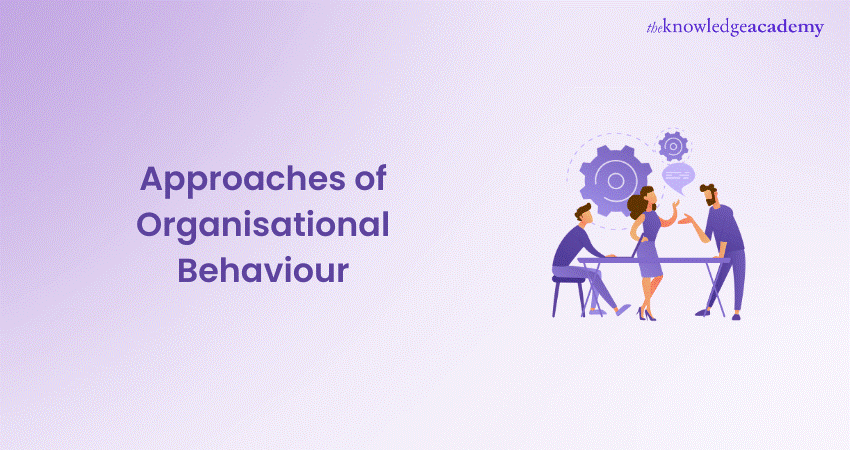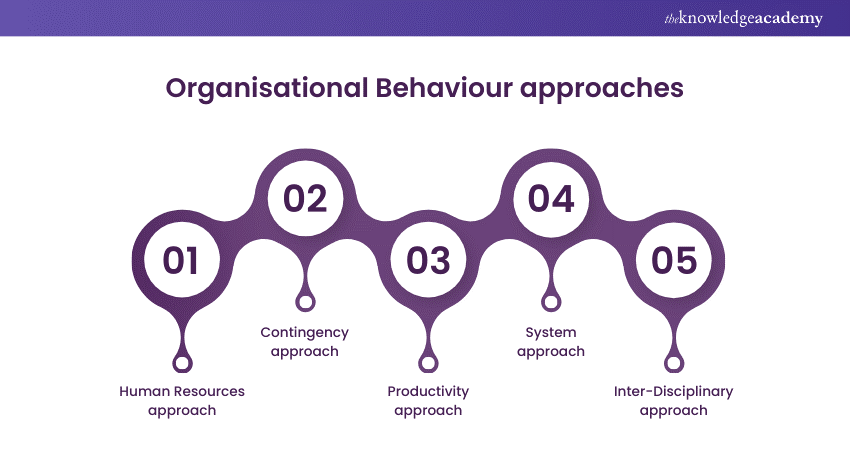We may not have the course you’re looking for. If you enquire or give us a call on +41 315281584 and speak to our training experts, we may still be able to help with your training requirements.
Training Outcomes Within Your Budget!
We ensure quality, budget-alignment, and timely delivery by our expert instructors.

Organisational Behaviour (OB) is like deciphering a synchronised dance—a blend of steps, rhythms, and patterns. Imagine you’re a part of this choreography. Each approach we explore is a dance move—the sway of productivity, the twirl of adaptability, the harmonious balance. So, let’s step onto the dance floor and learn the moves that keep organisational fires burning bright by understanding the different Approaches of Organisational Behaviour.
This blog will address the different approaches you can take to manage Organisational Behaviour and help you understand which ones are most applicable for your organisation. You can mix them up and improvise just like you would the with your moves on the dance floor. Are you ready to tango with turbulence in Organisational Behaviour. Let’s get to it then.
Table of Contents
1) What is an Organisational Behaviour?
2) Organisational Behaviour Approaches
a) Human Resources approach
b) Contingency approach
c) Productivity approach
d) System approach
e) Inter-Disciplinary approach
3) Conclusion
What is an Organisational Behaviour?
Organisational behaviour (OB) studies how individuals and groups behave within an organisational context. It’s like decoding the dance moves of a synchronised troupe—each step matters, and the rhythm determines the outcome.
Organisational Behaviour approaches
Let’s take a look at the different Approaches of Organisational Behaviour in detail:

1) Human Resources approach
Human resources approach focuses on the well-being of the employees manage their organisational behaviour. It does so in the following ways:
a) People-centric: This approach views employees as valuable assets. Their well-being, motivation, and development drive organisational success.
b) Employee satisfaction: Happy employees lead to higher productivity and better outcomes.
c) Training and development: Invest in your people and you will be rewarded by their performance.
2) Contingency approach
This approach focuses on adaptability, it allows room for flexibility to accommodate any deviations. It focuses on the following:
a) Context matters: There’s no one-size-fits-all solution. The best approach depends on the situation.
b) Adaptability: Organisations must adapt to external factors—like chameleons changing colours.
c) Flexible leadership: Leaders adjust their style based on the context.
3) Productivity approach
This approach focuses on getting the job done. It does so by focusing on:
a) Efficiency obsession: Productivity is the holy grail. Streamline processes, eliminate waste, and optimise resources.
b) Time management: Time is money. Use it wisely.
c) Performance metrics: Measure, analyse, improve.
Let's understand the Benefits Planning and Realisation, sign up for our BCS Professional Certificate In Benefits Planning And Realisation - sign up now!
4) System approach
This approach is based on the core belief of systems and how it helps functionality. It focuses on:
a) Holistic view: Organisations are interconnected systems. A change in one part affects the whole.
b) Feedback loops: Like a thermostat, systems self-regulate. Monitor inputs, outputs, and feedback.
c) Balance: Balance conflicting goals—profit vs. social responsibility, short-term vs. long-term gains.
5) Inter-Disciplinary approach
This is a mixed-matched approach that adapts the learnings of different disciplines to create a whole new approach. Here is how:
a) Blend of disciplines: Mix psychology, sociology, economics, and more.
b) Complexity: Organisations are intricate ecosystems. Understand the interplay of variables.
c) Innovation: Fresh ideas emerge at the intersection of disciplines.
Conclusion
“Approaches of Organisational Behaviour” are not just theory; they’re the choreography of success. As you step into the organisational arena, remember you’re not just a spectator but part of the dance. So, waltz with empathy, tango with strategy, and foxtrot with purpose. Let the flames of understanding illuminate your path.
This blog sheds light on the five significant Approaches of Organisational Behaviour you can use to improve the performance of your team by addressing behavioural concerns.
Change is inevitable, be ready for it. Sign up for our BCS Foundation Certificate In Business Change - register now!
Frequently Asked Questions

Absolutely! Understanding team dynamics, communication patterns, and individual motivations enhances collaboration. It also shows the employees your efforts of taking care of their wellbeing, boosting their moral.

Not at all! Organisational Behaviour principles apply to small businesses, nonprofits, and even family-run enterprises. Every fire needs a skilled marshal. It is a multipurpose model that can be adapted anywhere you have to manage the working together of a group of people.

The Knowledge Academy takes global learning to new heights, offering over 30,000 online courses across 490+ locations in 220 countries. This expansive reach ensures accessibility and convenience for learners worldwide.
Alongside our diverse Online Course Catalogue, encompassing 17 major categories, we go the extra mile by providing a plethora of free educational Online Resources like News updates, Blogs, videos, webinars, and interview questions. Tailoring learning experiences further, professionals can maximise value with customisable Course Bundles of TKA.

The Knowledge Academy’s Knowledge Pass, a prepaid voucher, adds another layer of flexibility, allowing course bookings over a 12-month period. Join us on a journey where education knows no bounds.

The Knowledge Academy offers various blogs on Business Analysis, including BCS Foundation Certificate In Organisational Behaviour, BCS Practitioner Certificate In Requirements Engineering and more. These courses cater to different skill levels, providing comprehensive insights into Strategic Business Management.
Our Business Analysis Blogs cover a range of topics related to Business Analysis, offering valuable resources, best practices, and industry insights. Whether you are a beginner or looking to advance your Management skills, The Knowledge Academy's diverse courses and informative blogs have you covered.
Upcoming Business Analysis Resources Batches & Dates
Date
 BCS Foundation Certificate in Organisational Behaviour
BCS Foundation Certificate in Organisational Behaviour
Thu 23rd May 2024
Thu 18th Jul 2024
Thu 19th Sep 2024
Thu 28th Nov 2024







 Top Rated Course
Top Rated Course



 If you wish to make any changes to your course, please
If you wish to make any changes to your course, please


